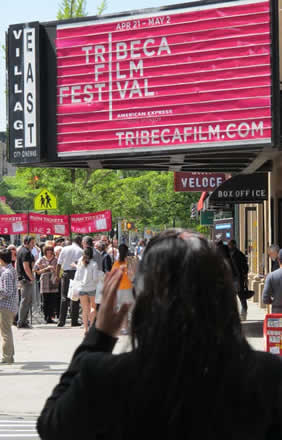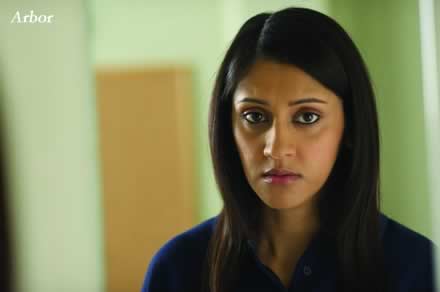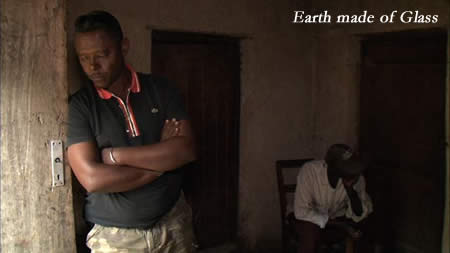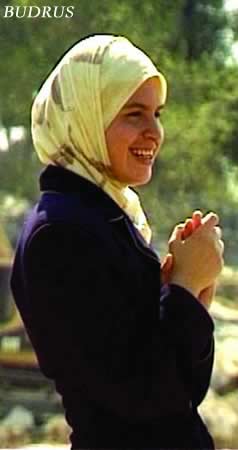 For the past two weeks, the news was filled with world-impacting events: first the outbreak of the unpronounceable Icelandic volcano, then the explosion of the oil rig in the Gulf of Mexico, furthermore the total collapse of the Greek economy plus a SUV loaded with explosives on Times Square – all of this framing the 9th Tribeca Film Festival. So, there will be plenty of new material to explore for next year’s festival!
For the past two weeks, the news was filled with world-impacting events: first the outbreak of the unpronounceable Icelandic volcano, then the explosion of the oil rig in the Gulf of Mexico, furthermore the total collapse of the Greek economy plus a SUV loaded with explosives on Times Square – all of this framing the 9th Tribeca Film Festival. So, there will be plenty of new material to explore for next year’s festival!
But – returning to this year’s edition: the following report will feature a few festival favorites – by the press, the professional juries, the public, and me personally.
After decades of award-winning work in news and current affairs, THE WOODMANS (2010) is C. Scott Willis’ first independent theatrical feature documentary. Betty and George Woodman are veteran artists; she a ceramics artist, he a painter. For them, life is art and art is life and when they decided to have children their art work became an essential element of family life. So growing up in this household, it seemed natural that both their children, Charles and Francesca, also became artists; Charles a multi-media professional and Francesca a photographer. Only, Francesca’s life got cut short when she committed suicide at age 22. In his film, Willis spends time with Betty, George, Charles, and some of Francesca’s friends to slowly unravel the story of her life, her art, and how much this talented artist’s work and spirit continues to be a part of this family, even after nearly 30 years – because today Francesca Woodman’s photography is well-known, exhibited and celebrated – unlike during her lifetime, when her work was hardly acknowledged. Filled with plenty of Francesca’s drawings, photographs, and short films; Scott not only tells the story of a struggling artist and a troubled soul, but also touches on themes like the artist’s need for recognition and the innate competition surrounding it, as well as using art and the process of creating to work through grief, guilt, loss, and closure. Deservedly, the jury awarded Willis with the Best New York Documentary Award.
Another award-winning film is Clio Barnard’s documentary THE ARBOR (2009). Just like THE WOODMANS, Barnard’s work looks at an artist’s family life, namely British author Andrea Dunbar, whose writings were inspired and nurtured by her life on the Buttershaw estate in Bradford, a notorious working class housing project in Northern England. Even after the successful publication and staging of her books and plays, Dunbar did not move and continued to live in this distressed neighborhood until she died of a brain hemorrhage at age 29. In her film, Barnard draws a portrait of a tormented writer and her tense relationship with her three children, all from different men. As the film progresses the focus starts to shift onto Dunbar’s oldest daughter, Lorraine. Step by step, Barnard reveals Lorraine’s life choices – taking her from bad to worse to complete and utter devastation –  and shows how history repeats itself from one generation to the next. Barnard takes a very unusual approach to her documentary filmmaking – rather than interviewing and filming the Dunbar family, Barnard conducted long interview sessions with each family member. From those audio recordings, she constructed a script and then cast actors to reenact the collected memories by lip-synching the original recordings. This approach creates an eerie and artificial atmosphere that further enhances the unsettling experience. At the same time, these staged reenactments allow the filmmaker to create a richer cinematic scenery. And given the fact that Andrea Dunbar was known for taking her inspiration right from the life around her, Barnard’s approach seems appropriately fitting. It is a powerful and provocative piece of work that received the Best New Documentary Filmmaker Award at this year’s festival.
and shows how history repeats itself from one generation to the next. Barnard takes a very unusual approach to her documentary filmmaking – rather than interviewing and filming the Dunbar family, Barnard conducted long interview sessions with each family member. From those audio recordings, she constructed a script and then cast actors to reenact the collected memories by lip-synching the original recordings. This approach creates an eerie and artificial atmosphere that further enhances the unsettling experience. At the same time, these staged reenactments allow the filmmaker to create a richer cinematic scenery. And given the fact that Andrea Dunbar was known for taking her inspiration right from the life around her, Barnard’s approach seems appropriately fitting. It is a powerful and provocative piece of work that received the Best New Documentary Filmmaker Award at this year’s festival.
Likewise devastating, but also showing first glimpses of hope, is Deborah Scranton’s documentary EARTH MADE OF GLASS (2010). Scranton follows the personal story of Rwandan native Jean Pierre Sagahutu and his search for the murderer of his father, a highly respected doctor who was killed during the 1994 genocide. Parallel to Jean Pierre’s quest, Scranton also unravels some of the back-story that laid the foundation for the devastating genocide that took place more than 15 years ago, tells how Rwandan President Paul Kagame came to power, and how his government attempts to reconcile and heal the country. Amazingly, Scranton and her team are there when Jean Pierre finally learns the name of his father’s murderer, when he confronts him, and when he is led to the place where the murder took place to uncover some of his remains so Jean Pierre and his family can eventually bury their father and grandfather and find some first closure. Allowing us to be part of this process and witnessing Jean Pierre’s dignity and composure, his grief and sadness, but also the hope he has for his children reminds us again and again that any life lost is one too many and what an impact it has on the next generations. Scranton’s work poses a lot of questions: Can an individual forgive? Can a nation reconcile? How can an individual and a nation move on after such  traumatic experiences? And how do you govern a nation suffering the aftermath of genocide? A very first step, it seems, is to acknowledge and to speak about the events, as in Jean Pierre’s case. After years of talking to the people from his former neighborhood; where everyone claimed that they were either sick, not there, or no longer remember the day his father was killed; eventually one woman steps forward and offers Jean Pierre the name of the person involved in the killing.
traumatic experiences? And how do you govern a nation suffering the aftermath of genocide? A very first step, it seems, is to acknowledge and to speak about the events, as in Jean Pierre’s case. After years of talking to the people from his former neighborhood; where everyone claimed that they were either sick, not there, or no longer remember the day his father was killed; eventually one woman steps forward and offers Jean Pierre the name of the person involved in the killing.
Another work that focuses on themes of reconciliation and peacemaking is BUDRUS (2009) by New York based filmmaker Julia Bacha. Over the course of a year, Bacha followed the villagers of Budrus, a small village in the West Bank near the Israeli border, as they struggle to peacefully ward off the Israeli government determined to erect a security wall on their territory, taking away from their land and uprooting their olive trees. BUDRUS demonstrates how easy it is to provoke when you have the machinery and military might – and how much more strength it takes to resist these provocation and remain calm and collected. Thankfully, for the people of Palestine and for the message of this film, the villagers’ non-violent resistance is rewarded. Although the wall is still built, it no longer runs through the villagers’ olive groves, but was redirected and built much closer to the Israeli border.
Although a small victory, it was a most important and empowering one for the Palestinians restraining from reacting and responding to the Israeli aggression. After a successful run at the Berlin Film Festival, where the documentary was the second-most audience favorite, it received a special jury mention at the Tribeca festival. 
Closing on a lighter note, let us move to Ricki Stern and Annie Sundberg’s SUNDANCE winner JOAN RIVERS: A PIECE OF WORK (2010). After collaborating on hard hitting documentaries like THE TRIALS OF DARRYL HUNT (2006), about a man imprisoned for a crime he did not commit, THE DEVIL CAME ON HORSEBACK (2007), about the genocide in Darfur and THE END OF AMERICA (2008), about author and feminist Naomi Klein’s assessment of the restrictions in civic liberties and legislation since 9/11, JOAN RIVERS: A PIECE OF WORK is a departure in tone and content, but not in substance. Following entertainment icon Rivers over the course of a year, we meet a hard working, highly disciplined and hugely dedicated author and performer who continues to hone her skills. Perfect for the dramatic arch of the film, we enter Rivers life as her appointment book shows plenty of white spaces – we stay with her through one season as she previews a new theater play in the UK, performs her comedy routine in high and low places, wins Donald Trump’s 2009 edition of CELEBRITY APPRENTICE, and sets out on a book signing tour – and leave her on a high, with a calendar so packed that there is no longer any space to write into. As Rivers’ daughter Melissa remembers, besides her mom, dad, and herself, there was always a fourth member of the family: Joan Rivers’ career – omnipresent and always seeking attention. Rivers numerous plastic surgeries, that may define her in other media, are only a minor side issue in this emotionally engaging and entertaining piece so that one only wonders why this strong and hard-hitting woman – who deserves all the credit for having made it in the male-dominated entertainment and comedy world – still feels the need to appear ageless. IFC will release JOAN RIVERS: A PIECE OF WORK later this summer.
As in previous years, the festival program is rich and rewarding in its documentary selection. the above are only five examples from a filled program. Overall, the festival screened 85 features and 47 short films from 38 countries over the course of 12 days.
For more information on the entire program, please visit: www.tribecafilm.com/festival/

